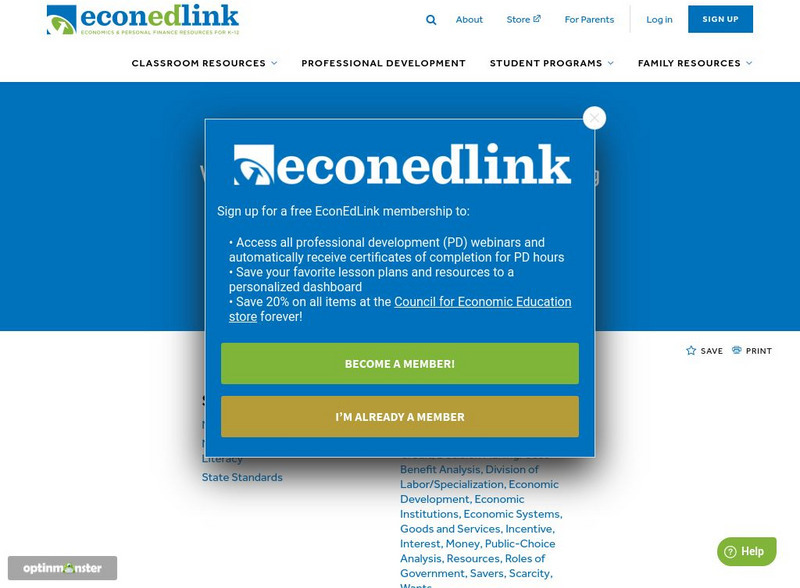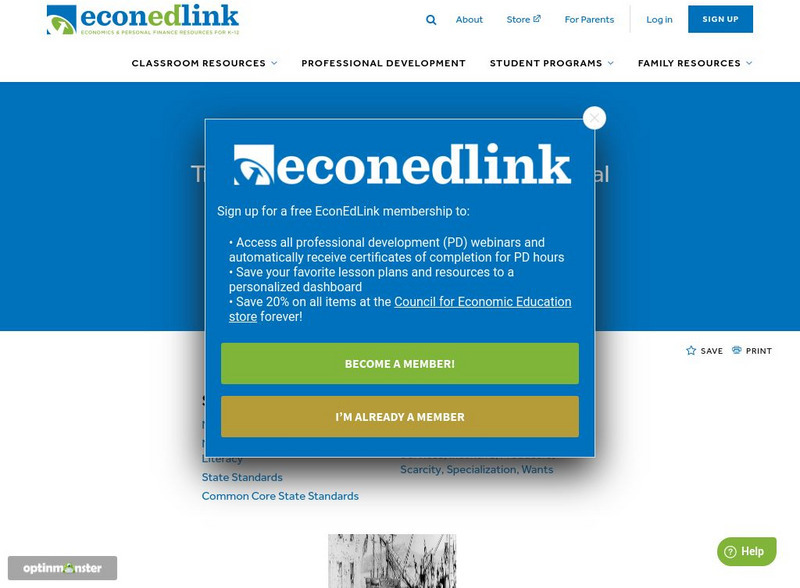Council for Economic Education
Econ Ed Link: The Economics of Voting: What Do You Mean My Vote Doesn't Count?
This lesson explores the costs and benefits associated with voting in national elections. Specifically, the concepts of rational apathy, rational ignorance and expressive voting are explained.
Council for Economic Education
Econ Ed Link: The 411 on College Education
What are the costs and benefits to getting a college degree? Use this lesson plan to get your students thinking about the options they have for higher education and how to pay for it.
Other
Texas Comptroller of Public Accounts: The Energy Report: Solar Energy [Pdf]
Chapter 10 of a report on the energy industry in Texas. It examines solar energy, its history, and how it is used. The solar power industry in Texas is described, its economic importance, methods of producing it, and how it is...
Other
Texas Comptroller of Public Accounts: The Energy Report: Wind Energy [Pdf]
Chapter 11 of a report on the energy industry in Texas. It looks at wind energy, its history, and how it is used. The wind power industry in Texas is described, its economic importance, how it is produced and transmitted, and its...
Council for Economic Education
Econ Ed Link: Transportation: They Say We Had a Revolution (Part 1)
Advancements in transportation have played a key role in the growth of our nation. U.S.government policies have also had a considerable impact on the development of transport as we know it today. In this series of three lessons, the...
Council for Economic Education
Econ Ed Link: Fewer Watts and Fatter Wallets
Students learn about incentives for alternative energy programs and the role played by non-price determinants in energy choices.
Council for Economic Education
Econ Ed Link: Tapped Dry: How Do You Solve a Water Shortage?
Economists do not operate in a vacuum. If an economist is going to suggest that the price of a good needs to be increased, he or she needs to consider who will bear the increase in costs. Will the costs be distributed equally or will one...
Council for Economic Education
Econ Ed Link: Chevy Volt It's Electric!
The costs and benefits of owning an electric or hybrid car will be evaluated in this lesson. By reading and researching the history of the production of electric cars, the lesson allows students to understand how this market has developed.
Council for Economic Education
Econedlink: Elasticity of Demand Video and Quiz
This video teaches the concept of Elasticity of Demand. Price elasticity of demand is the way of measuring how much quantity demanded will change in response to a change in price. The website contains an interactive quiz and links for...
Council for Economic Education
Econ Ed Link: Are the Best Things in Life Free?
Young scholars use economic reasoning to analyze the costs and consequences of choice. The idea that the best things in life are free is widely expressed as a maxim by people who know nothing of its origin. They know it's true through...
Council for Economic Education
Econ Ed Link: The Best Deal
Students will learn how to determine 'price per unit' to help make decisions when comparing products.
Council for Economic Education
Econ Ed Link: Clipping Coupons
Explore this website to find out how and why consumers make choices on what products to buy. Learn how producers entice consumers into buying their products. This is a very informative lesson plan.
Council for Economic Education
Econ Ed Link: What Happened to Railroads?
Between the Civil War and World War II, railroads were one of the nation's most important businesses and an integral part of people's lives. In this lesson, students assume the role of detectives investigating why the rail companies...
Council for Economic Education
Econ Ed Link: Satisfaction Please! (Part I)
Even the savviest consumer has a problem with a good or service on occasion. It is a consumer's right to complain when there is a genuine problem. In some situations, it is also a consumer's responsibility. A problem can't be fixed if no...
Council for Economic Education
Econ Ed Link: It's a Matter of Power
Students examine tradeoffs and profit- maximization decisions in the case study of Kaiser Aluminum, which decided to shut down aluminum production in favor of reselling electricity.
Council for Economic Education
Econ Ed Link: Be All You Can Be for Minimum Wage? (Educator Page)
This instructional activity ask students to calculate the percentage change in military strength over the last two decades, hypothesize economic (and non-economic) explanations for these changes, test hypothetical explanations by reading...
Council for Economic Education
Econ Ed Link: Work, Earnings and Economics: Using Lyddie by Katherine Paterson
In reading and discussing Lyddie, by Katherine Paterson, students examine basic economic concepts and explore the growth of labor unions and the role of government in a market economy.
Council for Economic Education
Econ Ed Link: Trouble Is Brewing in Boston: "Colonial Voices Hear Them Speak"
It's December 16, 1773 and many of the citizens of Boston are furious with King George's new tax on tea. Young Ethan, a printer's errand boy, has been given the task of conveying information concerning an upcoming protest meeting. As he...
Council for Economic Education
Econ Ed Link: National Parks: Only You Can Prevent the Coming Crisis
What do you think of when you think of the National Parks System? Do you think of the majesty of the Grand Canyon and the redwoods of Northern California? Or does the serenity of Cape Cod and the Everglades come to mind?
Other
Texas Comptroller of Public Accounts: The Energy Report: Ocean Power [Pdf]
Chapter 20 of a report on the energy industry in Texas. It looks at power generated from the ocean, its history, and uses. This is a source that has been minimally developed in Texas and is unlikely to develop in the near future. It...
Other
Texas Comptroller of Public Accounts: The Energy Report: Geothermal [Pdf]
Chapter 21 of a report on the energy industry in Texas. It looks at geothermal energy, its history, and uses. The economic impact of geothermal energy in Texas is described, and its production, transmission, and availability. Also looks...
Other
Texas Comptroller of Public Accounts: The Energy Report: Hydrogen [Pdf]
Chapter 22 of a report on the energy industry in Texas. It looks at hydrogen as an energy source, its history, and uses. The economic impact of the hydrogen energy sector in Texas is described, the consumption of hydrogen, methods of...
Council for Economic Education
Econ Ed Link: Marketplace: Doing Business in Afghanistan
In May 2002, delegates from governments, international companies, and financial institutions met at a United Nations conference in Tehran to discuss the reconstruction of Afghanistan. Afghanistan's officials say that to create a viable...
Council for Economic Education
Econ Ed Link: Every Penny Counts
Lesson that helps learners understand that people must make choices about the goods and services they purchase. Students recognize the prices indicate what people pay for goods and services, learn to compare prices, and understand that...






